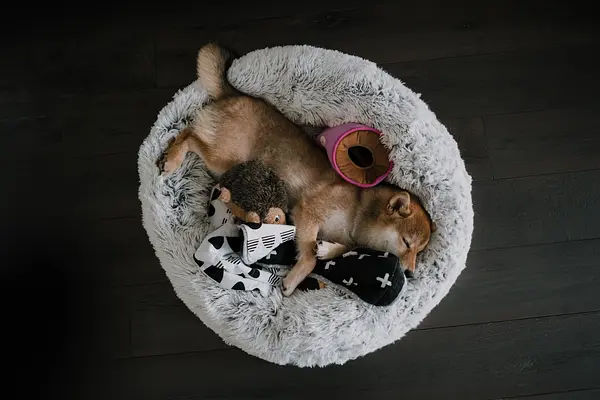एक पपी पैरेंट के तौर पर, आप जानते हैं कि रात में अच्छी नींद आपके और आपके प्यारे दोस्त दोनों के लिए ज़रूरी है। हालाँकि, जब आपका कुत्ता लगातार आपको रात के बीच में जगाता है, तो यह निराशाजनक और थका देने वाला हो सकता है। उम्मीद मत खोइए - ऐसी कई रणनीतियाँ हैं जिनका इस्तेमाल करके आप अपने पपी को अच्छी नींद दिला सकते हैं और यह सुनिश्चित कर सकते हैं कि आप दोनों को ज़रूरी आराम मिले।
रात्रि में जागने के सामान्य कारण
नींद की गड़बड़ी को संबोधित करने से पहले, यह समझना ज़रूरी है कि आपका कुत्ता रात में क्यों जागता है। कुछ सामान्य कारणों में शामिल हैं:
1.पॉटी की जरूरतें: युवा पिल्लों का मूत्राशय छोटा होता है और उन्हें रात के दौरान शौचालय जाने की आवश्यकता हो सकती है। 2.भूख या प्यास: बढ़ते हुए पिल्लों की ऊर्जा की मांग बहुत अधिक होती है और वे भूख या प्यास महसूस करते हुए जाग सकते हैं। 3.चिंता या भय: कुछ कुत्ते रात में अकेले छोड़े जाने पर चिंतित या भयभीत महसूस कर सकते हैं, जिसके कारण वे रोना या भौंकना शुरू कर देते हैं। 4.असुविधा या दर्द: यदि आपका कुत्ता शारीरिक असुविधा या दर्द महसूस कर रहा है, तो इससे वह जाग सकता है और ध्यान आकर्षित कर सकता है।
रात्रि में जागने की समस्या से निपटने की रणनीतियाँ
1.एक सुसंगत नींद की दिनचर्या स्थापित करें: सोने से पहले की दिनचर्या बनाएं जिसमें अंतिम बार शौच के लिए जाना, एक शांत गतिविधि और एक स्पष्ट संकेत शामिल हो कि सोने का समय हो गया है। अपने कुत्ते को यह समझने में मदद करने के लिए हर रात इस दिनचर्या का पालन करें कि उसे कब शांत होने का समय है।
2.सुनिश्चित करें कि आपके कुत्ते की शारीरिक ज़रूरतें पूरी हों: सोने से पहले, सुनिश्चित करें कि आपके पिल्ले को पर्याप्त व्यायाम, भोजन, पानी और शौच का मौका मिला है। इससे शारीरिक ज़रूरतों के कारण रात में जागने की संभावना को कम करने में मदद मिल सकती है।
3.आरामदायक नींद का माहौल बनाएँ: अपने कुत्ते को एक शांत, अंधेरे कमरे में एक आरामदायक बिस्तर या टोकरा प्रदान करें। नींद को बढ़ावा देने वाला सुखदायक माहौल बनाने के लिए व्हाइट नॉइज़ मशीन या हल्का संगीत बजाने पर विचार करें।
4.धीरे-धीरे नींद का समय बढ़ाएँ: अगर आपके पपी को रात में शौच के लिए ब्रेक की ज़रूरत है, तो धीरे-धीरे ब्रेक के बीच का समय बढ़ाएँ क्योंकि वे बड़े होते हैं और मूत्राशय पर बेहतर नियंत्रण विकसित करते हैं। इससे उन्हें लंबे समय तक सोना सीखने में मदद मिल सकती है।
5.चिंता या डर को दूर करें: अगर आपका कुत्ता रात में चिंतित या भयभीत लगता है, तो उसे अपनी खुशबू वाला कोई मुलायम खिलौना या कंबल जैसी आरामदायक वस्तु देने की कोशिश करें। आप चिंता को कम करने के लिए शांत करने वाले फेरोमोन डिफ्यूज़र का उपयोग करने या अन्य रणनीतियों के बारे में अपने पशु चिकित्सक से बात करने पर भी विचार कर सकते हैं।
6.चिकित्सा संबंधी समस्याओं को दूर करें: यदि आपके कुत्ते का रात में जागना एक नया व्यवहार है या अन्य लक्षणों के साथ प्रतीत होता है, तो किसी भी अंतर्निहित चिकित्सा समस्या को दूर करने के लिए अपने पशु चिकित्सक से परामर्श करना आवश्यक है जो असुविधा या दर्द का कारण हो सकता है।
स्थिरता और धैर्य का महत्व
नींद की गड़बड़ी को संबोधित करते समय, निरंतरता और धैर्य महत्वपूर्ण हैं। आपके कुत्ते को नई नींद की दिनचर्या में समायोजित होने में कुछ समय लग सकता है, लेकिन निरंतर और सकारात्मक बने रहने से, आप उन्हें रात भर सोना सीखने में मदद करेंगे। रास्ते में छोटी-छोटी जीत का जश्न मनाएं और याद रखें कि हर कुत्ता अनोखा होता है - जो एक के लिए काम करता है वह दूसरे के लिए काम नहीं कर सकता है।
अगर आप रात में जागने की समस्या से खुद ही निपटने में संघर्ष कर रहे हैं, तो मार्गदर्शन के लिए किसी पेशेवर डॉग ट्रेनर या व्यवहार विशेषज्ञ से संपर्क करने में संकोच न करें। सही सहायता और रणनीतियों के साथ, आप और आपका प्यारा दोस्त दोनों शांतिपूर्ण, निर्बाध रात की नींद का आनंद ले सकते हैं।
अपने कुत्ते की नींद के पैटर्न और प्रगति को ट्रैक करना आसान बनाने के लिए, "डॉगी टाइम" ऐप का उपयोग करने पर विचार करें। यह आसान उपकरण आपको अपने पिल्ले की गतिविधियों को लॉग करने में परिवार के सदस्यों के साथ सहयोग करने की अनुमति देता है, जिसमें नींद का समय, शौच के लिए ब्रेक और रात में होने वाली कोई भी गड़बड़ी शामिल है। स्मार्ट अलार्म और शेड्यूलिंग सुविधाओं के साथ, "डॉगी टाइम" आपको अपने कुत्ते की नींद की दिनचर्या के अनुरूप रहने और समय के साथ सुधार की निगरानी करने में मदद कर सकता है। इसे आज़माएँ और देखें कि यह आपको और आपके कुत्ते को अच्छी रात की नींद की यात्रा में कैसे सहायता कर सकता है!






